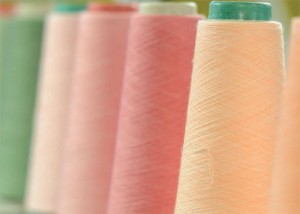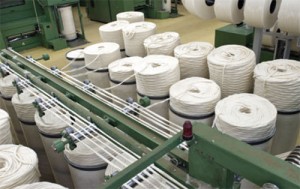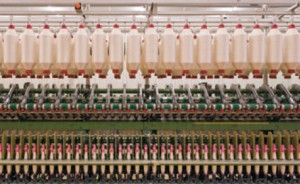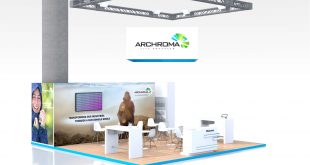 The Swiss Hermann Bühler AG produce yarn for the most discerning customers at the facility in Wintherthur and in a subsidiary factory in Jefferson/USA. The company, whose tradition goes back 200 years, set standards with regard to innovative products, first-rate quality and perfect customer service. Beyond this the yarn manufacturer has had the environmentally friendly and socially responsible production conditions certified to OEKO-TEX® Standard 1000 since 2007 and is also entitled to mark the products with the OEKO-TEX® Standard 100plus label. el
The Swiss Hermann Bühler AG produce yarn for the most discerning customers at the facility in Wintherthur and in a subsidiary factory in Jefferson/USA. The company, whose tradition goes back 200 years, set standards with regard to innovative products, first-rate quality and perfect customer service. Beyond this the yarn manufacturer has had the environmentally friendly and socially responsible production conditions certified to OEKO-TEX® Standard 1000 since 2007 and is also entitled to mark the products with the OEKO-TEX® Standard 100plus label. el
Tradition and innovation
Tradition and innovation are closely linked at Hermann Bühler AG. ‘The striving for high-quality products has characterised us from the beginning and still remains the key to our successful work. The basis is high and reliable product quality, but uncompromising implementation of new technologies and innovative ideas are an absolute must,’ explains Martin Kägi, CEO. The company have specialised in the processing of American extra long fibre staple Supima® cotton which – mainly due to its high fibre strength – offers ideal preconditions for further processing into products of the highest quality. The fibres used for the production of Micro Modal® Edelweiss and Micro Tencel® yarns are produced by the Austrian company Lenzing AG using exclusively FSC (Forest Stewardship Council) certified wood. These are the finest among all cellulose fibres, featuring versatile functional properties such as perfect moisture management. Yarn mixtures from selected materials such as silk and Micro Modal® Edelweiss allow the production of sophisticated and extra fine yarn for the most beautiful creations. These are used wherever highest quality and exclusivity are required, e.g. in high-quality shirts and blouses, exclusive underwear and nightwear or fine bed linen.
Quality and responsibility
 3,300 tons of the extensive yarn range are produced by 145 employees in the Swiss canton Zuerich. The 145 employees in the US state Georgia spin 3,700 tons. Numerous yarn qualities which the company supply to many international circular knitting mills, weaving mills and knitting mills are the basic material for a great variety of swiss+cotton® textiles. The yarn range of the company meets the highest requirements not only where product quality is concerned, though, but also in terms of production ecology. As one of the very first companies, Hermann Bühler AG have been documenting the human ecology optimisation of their yarns according to OEKOTEX ® Standard 100 since 1993. Furthermore the company were additionally certified to OEKO-TEX® Standard 1000 in 2007 to confirm the environmentally friendly and socially responsible production conditions. The OEKO-TEX® Standard 100plus product label gives the company the opportunity to advertise the human ecology optimisation of their products according to OEKO-TEX® Standard 100 as well as their environmentally friendly production processes according to OEKO-TEX® Standard 1000 to their customers with just one test label. These certifications reflect the comprehensive commitment in the areas of environmental protection and sustainability which is firmly rooted in the company philosophy of Hermann Bühler AG. Martin Kägi is convinced that the future belongs to ecologically sound textile products: ‘Products which are harmless from a human ecology point of view are a must today. Manufacturers as well as end customers want safety. They expect the textiles to be tested for harmful substances and certified by an independent authority. That is why nearly all customers in Europa require certification to OEKO-TEX® Standard 100 today. We have even seen an increasing popularity of the OEKO-TEX® Standard in countries overseas such as the USA. Our American subsidiary has been certified to OEKO-TEX® Standard 100 since 2012.’
3,300 tons of the extensive yarn range are produced by 145 employees in the Swiss canton Zuerich. The 145 employees in the US state Georgia spin 3,700 tons. Numerous yarn qualities which the company supply to many international circular knitting mills, weaving mills and knitting mills are the basic material for a great variety of swiss+cotton® textiles. The yarn range of the company meets the highest requirements not only where product quality is concerned, though, but also in terms of production ecology. As one of the very first companies, Hermann Bühler AG have been documenting the human ecology optimisation of their yarns according to OEKOTEX ® Standard 100 since 1993. Furthermore the company were additionally certified to OEKO-TEX® Standard 1000 in 2007 to confirm the environmentally friendly and socially responsible production conditions. The OEKO-TEX® Standard 100plus product label gives the company the opportunity to advertise the human ecology optimisation of their products according to OEKO-TEX® Standard 100 as well as their environmentally friendly production processes according to OEKO-TEX® Standard 1000 to their customers with just one test label. These certifications reflect the comprehensive commitment in the areas of environmental protection and sustainability which is firmly rooted in the company philosophy of Hermann Bühler AG. Martin Kägi is convinced that the future belongs to ecologically sound textile products: ‘Products which are harmless from a human ecology point of view are a must today. Manufacturers as well as end customers want safety. They expect the textiles to be tested for harmful substances and certified by an independent authority. That is why nearly all customers in Europa require certification to OEKO-TEX® Standard 100 today. We have even seen an increasing popularity of the OEKO-TEX® Standard in countries overseas such as the USA. Our American subsidiary has been certified to OEKO-TEX® Standard 100 since 2012.’
Sustainability in all areas
 The concept of sustainability can be seen in all areas and activities of Hermann Bühler AG: ‘It starts with the selection of the fibres used by us and continues with the use of renewable energy sources all the way to short transport routes of the products to our customers in Europe,’ Martin Kägi explains. ‘Beyond this our machinery is constantly being monitored and optimised with regard to yarn quality and productivity. For years we have been employing the revolutionary AirJet spinning method by Rieter which significantly increases the yarn output while reducing energy consumption by up to 30%.’ Hermann Bühler AG are one of the pioneers in the organic cotton business and have been producing yarn from American extra long fibre staple cotton from certified organic farming (kbA) since 1994. The production of the kbA cotton range ‘SwissCotton® Organic’ is completely CO2 free as it uses no fossil fuels. Electricity for this is generated in company-owned, small local hydroelectric power stations which supply around 10 per cent of the total required energy from this regenerative resource. The Rainbow technology developed in-house furthermore allows dyeing without adding salt or sodium carbonate, meaning these substances can be omitted. Martin Kägi is convinced by the many advantages of the technology: ‘Our Rainbow dyeing process noticeably reduces the strain on the environment. The significantly higher dye yield also lets us reduce the required amount of dyestuff, making optimised waste water treatment possible as well. What is more, Rainbow items can be dyed using conventional machines, chemicals and dyes with excellent results.’ With the introduction of the Micro Modal® Edelweiss and Micro Tencel® fibres, Hermann Bühler AG have additionally set standards for environmentally friendly production processes. The Edelweiss technology developed by Lenzing allows chlorine-free, CO2 neutral production from cellulose to fibre. 85 per cent of the energy required for fibre production is generated from the wood waste from cellulose production. Another factor in the positive environmental balance is the renewable raw material (European beechwood) used and a high cellulose yield per area without use of irrigation, fertiliser and pesticides. Bühler is the very first spinning mill to process the new Micro Modal® Edelweiss fibre. The manufacturing process of the Micro Tencel® fibre at Lenzing is also environmentally friendly and economical as it is based on a unique closed circuit of the solvent used. It is recovered to nearly 100 % and the very low remaining emissions are broken down in biological purification plants. For Martin Kägi it is only logical to focus on sustainable measures in production: ‘For consumers it is the high quality of the end product from our yarn that counts, because in the end clothing that lasts longer is also more sustainable.
The concept of sustainability can be seen in all areas and activities of Hermann Bühler AG: ‘It starts with the selection of the fibres used by us and continues with the use of renewable energy sources all the way to short transport routes of the products to our customers in Europe,’ Martin Kägi explains. ‘Beyond this our machinery is constantly being monitored and optimised with regard to yarn quality and productivity. For years we have been employing the revolutionary AirJet spinning method by Rieter which significantly increases the yarn output while reducing energy consumption by up to 30%.’ Hermann Bühler AG are one of the pioneers in the organic cotton business and have been producing yarn from American extra long fibre staple cotton from certified organic farming (kbA) since 1994. The production of the kbA cotton range ‘SwissCotton® Organic’ is completely CO2 free as it uses no fossil fuels. Electricity for this is generated in company-owned, small local hydroelectric power stations which supply around 10 per cent of the total required energy from this regenerative resource. The Rainbow technology developed in-house furthermore allows dyeing without adding salt or sodium carbonate, meaning these substances can be omitted. Martin Kägi is convinced by the many advantages of the technology: ‘Our Rainbow dyeing process noticeably reduces the strain on the environment. The significantly higher dye yield also lets us reduce the required amount of dyestuff, making optimised waste water treatment possible as well. What is more, Rainbow items can be dyed using conventional machines, chemicals and dyes with excellent results.’ With the introduction of the Micro Modal® Edelweiss and Micro Tencel® fibres, Hermann Bühler AG have additionally set standards for environmentally friendly production processes. The Edelweiss technology developed by Lenzing allows chlorine-free, CO2 neutral production from cellulose to fibre. 85 per cent of the energy required for fibre production is generated from the wood waste from cellulose production. Another factor in the positive environmental balance is the renewable raw material (European beechwood) used and a high cellulose yield per area without use of irrigation, fertiliser and pesticides. Bühler is the very first spinning mill to process the new Micro Modal® Edelweiss fibre. The manufacturing process of the Micro Tencel® fibre at Lenzing is also environmentally friendly and economical as it is based on a unique closed circuit of the solvent used. It is recovered to nearly 100 % and the very low remaining emissions are broken down in biological purification plants. For Martin Kägi it is only logical to focus on sustainable measures in production: ‘For consumers it is the high quality of the end product from our yarn that counts, because in the end clothing that lasts longer is also more sustainable.
 Tekstil Teknik Dergisi Tekstil Haberleri, Tekstil Sektörü, Tekstil Teknik
Tekstil Teknik Dergisi Tekstil Haberleri, Tekstil Sektörü, Tekstil Teknik




